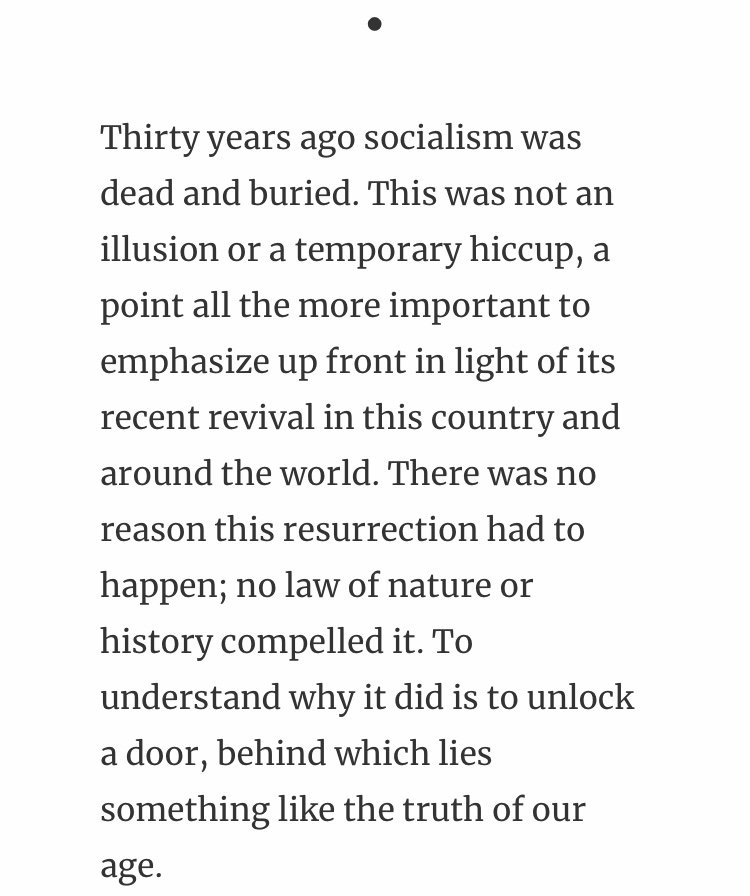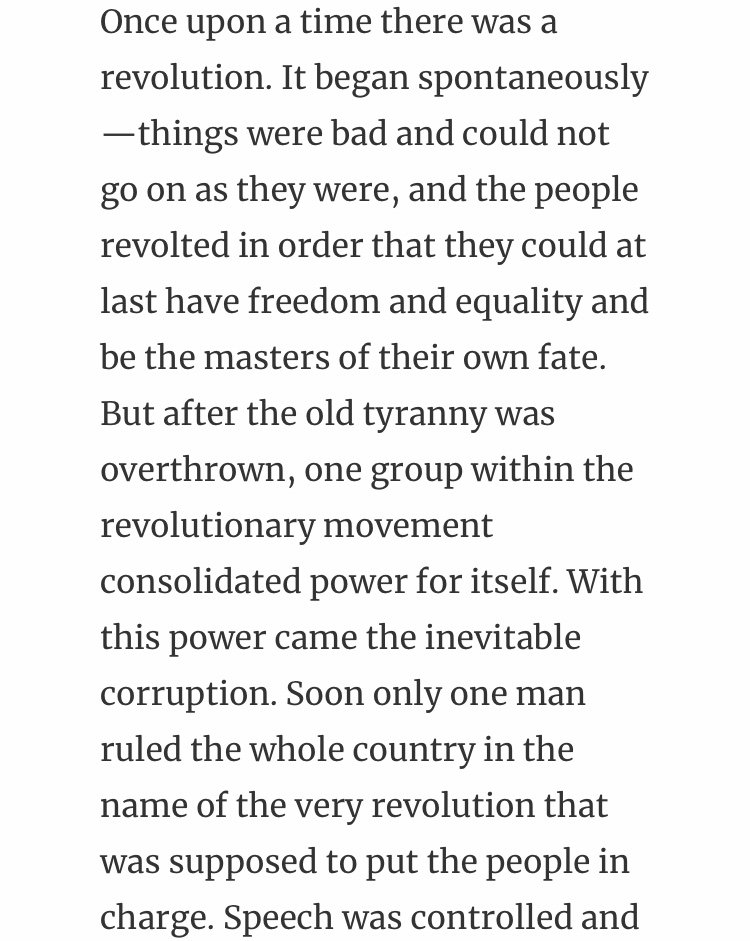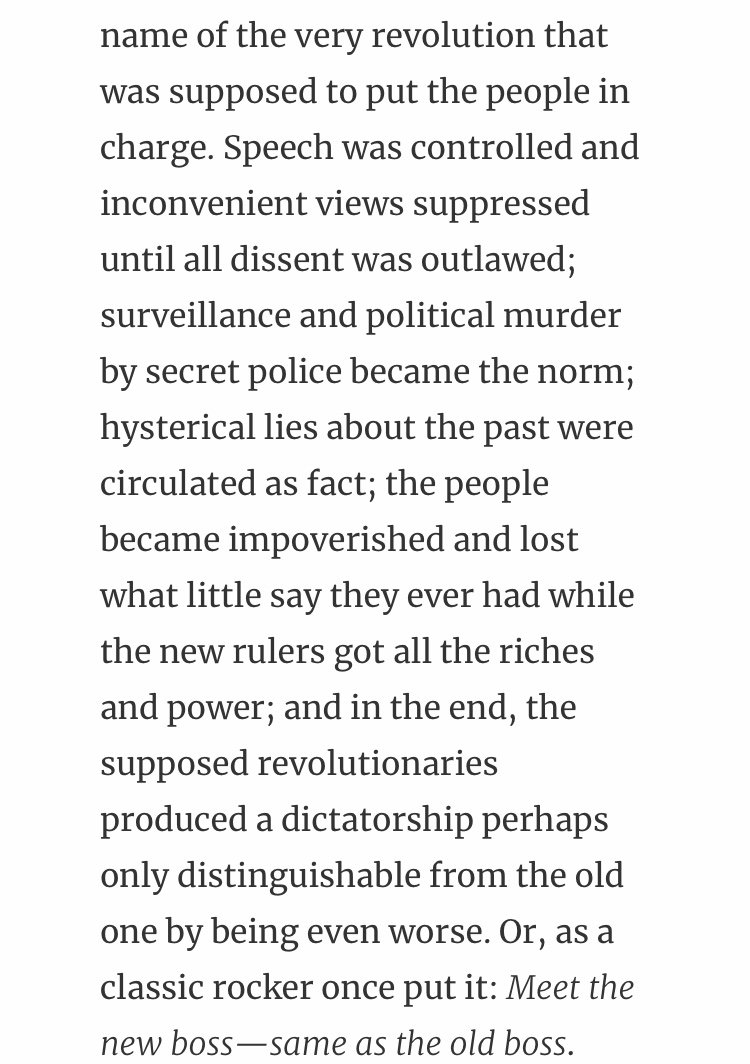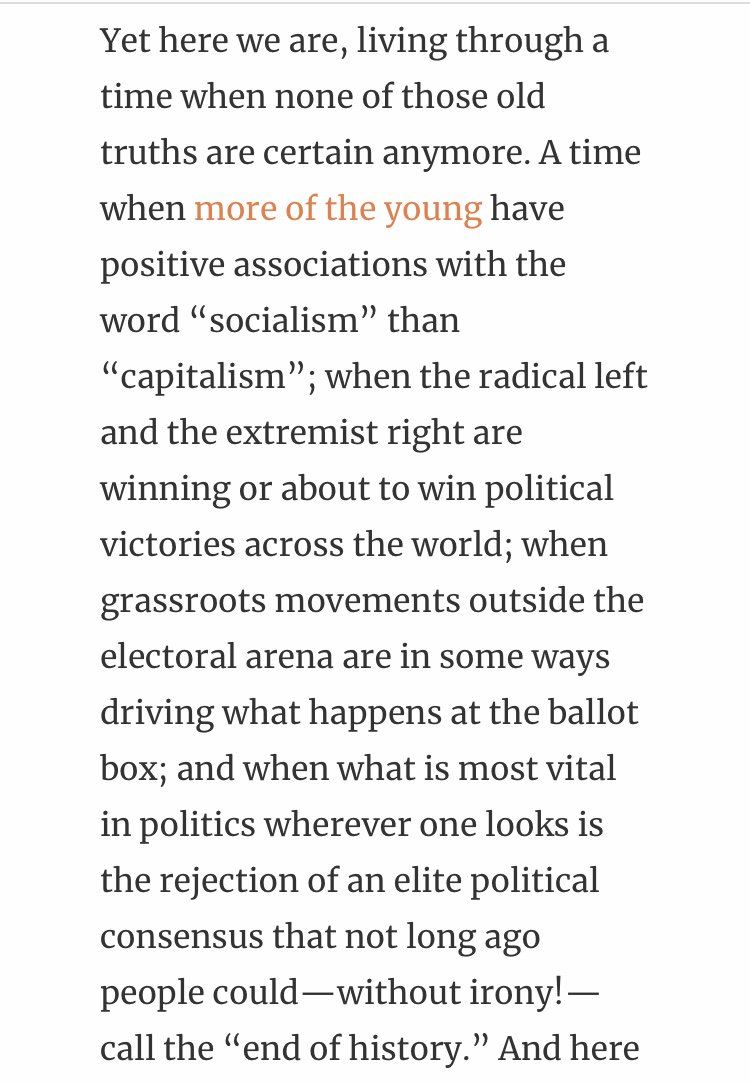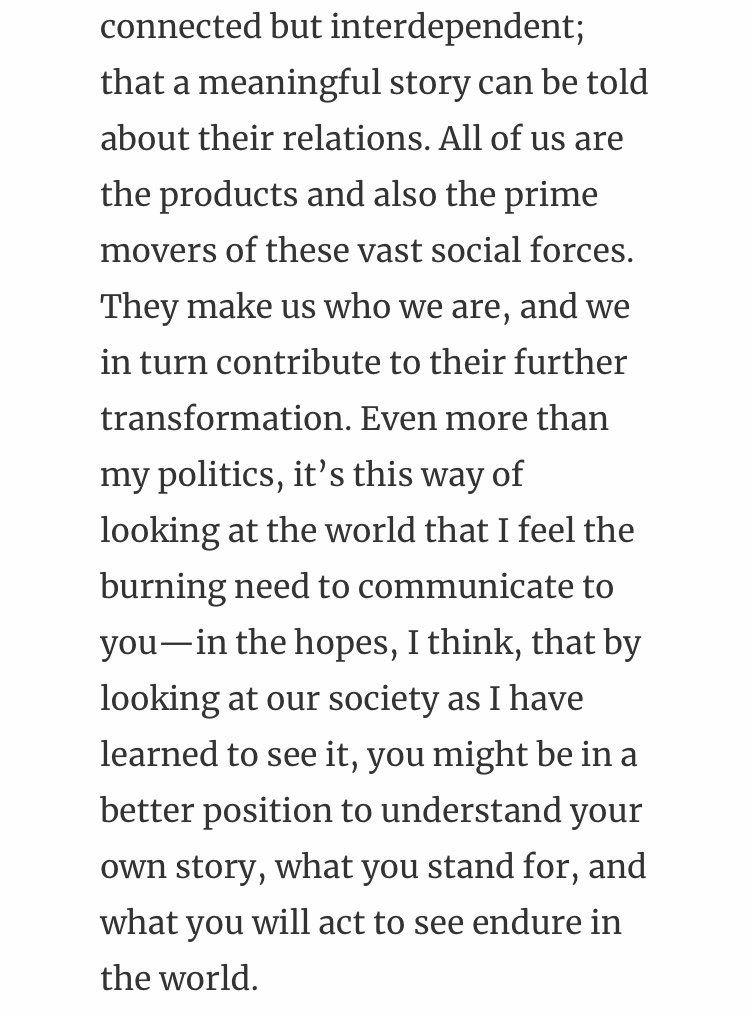
Nothing is so exhausting -- or so triggers my own self-loathing, when I replicate it -- as the sneering tone of smug, self-satisfied nihilism and ironic detachment from one's own moral commitments which is the house style of everyone on this stupid website.
It's interesting from a litcrit point of view. Through the later part of the last century & the start of this one, something like this register of writing -- DFW called it "postmodern irony" -- was used for a very different reason.
As he explains in his famous TV essay, the point of this obligatory, flat-affect, preening cynicism towards the idea that anybody could ever believe in anything was to reconcile oneself to the (false) notion that all previous attempts at earnest commitment failed and had to fail.
Commitment, that is, to ideals, to notions of a higher good outside one's own self-interest, to religion, or above all to a political perspective. Instead, as Fred Jameson pointed out, past versions of these things became a grab-bag of tropes for writers to mock or play with.
Why was the nihilistic idea that belief in anything is futile so common among writers -- "obligatory," as I called it, or to be expected, or even enforced?
Mark Fisher was the most eloquent of those who pointed out it was closely tied to the near-total ideological victory of capitalism during the neoliberal period.
Post-89 capitalism no longer came to be seen as one among many possible economic forms or value-systems, but as the only possible way things could work. Fisher called that "capitalist realism." I meant something similar with "dictatorship of the present."
thepointmag.com/politics/the-d…
thepointmag.com/politics/the-d…
But we are far removed from that era of postmodern irony. After Occupy, everything began to slowly change -- and after Trump, the change was irreversible.
Ours is an age not of apathy but of commitment. Everything has been politicized. We are at war over the future of society.
Ours is an age not of apathy but of commitment. Everything has been politicized. We are at war over the future of society.
The analogy I use in my own mental model is the transition from the 1920s to the 1930s. It's not a perfect comparison, but it's similar enough that it gets the job done.
But of course, the problem with everything being about commitment is the possibility that dogma, cult, & propaganda replace culture, reporting, and critical thought.
If the artist of the 1990s struggled to commit themselves to beliefs that connected to a true world, a human world beneath the obviously false spectacle conjured up by ubiquitous and monolithic capitalist mass media...
...the artist of the 2020s, in a fractured media of echo chambers & disinformation campaigns & censors, struggles to take part in the struggle for decency without letting themselves become a puppet of one of "the smelly little orthodoxies which are now contending for our souls.”
So to get back to tweets: postmodern irony, rather than going away as I would've hoped it would, has just evolved as the surrounding social environment has evolved.
It has done so in a number of ways.
It has done so in a number of ways.
For one thing, it has acquired a function as a kind of gateway drug to commitment, or as a bridge from apathy to commitment.
People beginning to develop a political consciousness of one sort or another would jokingly, in an ironic-detached way, espouse views deemed extreme by the social norms of the time.
Initially, the joke was to be read: "isn't it so silly that anybody would believe this?"
Initially, the joke was to be read: "isn't it so silly that anybody would believe this?"
But just as the Derrida types taught us in English class, every kind of language ultimately subverts itself through the ambiguities of words and their history, as well as the unstable and shifting structures or systems of meaning in which they're embedded.
That sounds high-falutin', but it becomes clearer when you look at a concrete case.
In this case, people were ironic Nazis, & then they were Nazis. The 'joke' was initially how ridiculous it would be to be a Nazi, but at one & the same time it was testing out how it would feel.
In this case, people were ironic Nazis, & then they were Nazis. The 'joke' was initially how ridiculous it would be to be a Nazi, but at one & the same time it was testing out how it would feel.
This was happening long before anybody began noticing. Eventually the culture caught up to its own subtle transformations and gave this process a name, irony poisoning. It's an important idea antifascists have often used to describe people's radicalization to the far right.
But the thing nobody really wants to talk about is that it wasn't just the fascists who underwent irony poisoning.
The culture producers (as opposed to the rank-and-file) associated with more or less every major political faction outside the centrist establishment did the same.
The culture producers (as opposed to the rank-and-file) associated with more or less every major political faction outside the centrist establishment did the same.
The dirtbag left podcasters, e.g., talked themselves into their current views first through a series of ironic jokes -- the guillotine meme is sort of the paradigmatic example.
A subset of them started making pseudo-ironic Stalin memes as well. A bit later, the tankie revival.
A subset of them started making pseudo-ironic Stalin memes as well. A bit later, the tankie revival.
So postmodern irony, which in the previous generation hindered or inhibited commitment, now facilitates it. And the transition from apathy to commitment mediated by postmodern irony is, I would argue, the defining artistic mood of the late 2010s.
Because, as far as literature goes, the American novel is effectively dead but the last twenty years or so were the golden age of the American essay (now ended), you really saw this happening in real time in the nonfiction part of the best little magazines.
But I think something similar was at work in comedy, podcasts, music, & other artforms accessible to producers outside the realms of the old institutional gatekeepers. In more capital-intensive, centrally controlled media like film & TV it was nonexistent, far as I can tell.
Now, this isn't the only function of postmodern irony in the present period of political struggle. I'll get into some others next.
For one thing, the way postmodern irony mediated a political transition isn't just a one-time historical process that's well and done with, as I've been discussing it up to now. It's not just for transitions from apathy to commitment, but from one type of commitment to another.
So when you see, say, a dirtbag left podcaster or a stupidpol type DSAer who already has a politics making ironic jokes alluding to race & IQ or rape or how based the old workers' movement was for being willing to throw feminists & queers under the bus to get social democracy...
...what you're really seeing is their use of postmodern irony to toy with, inspect, and talk themselves into throwing their lot in with the "national conservatives" and the far-right rather than the "degenerate" left. This already has a name, the "post-left" -- cf The Bellows.
Now, it would be reductive and ridiculous to treat someone joking in this way as already post-left and a post-left person as already fully fascist. That's not really how it works. But there is a clear progression that at least some complete, often with the aid of postmodern irony
And again, more importantly, this is a *general* phenomenon. I picked the first example that came to mind but really, many of the loudmouth proponents of all the big political factions use postmodern irony in this way when gearing up to transition to another faction.
You saw it with liberals who were turning into Bernie people in 2016; or with leftists who became IDW-style culture war neo-centrists in 2017-2019; or, what's even more interesting, with former alt-righters who did the same move centerwise after losing street battles to antifa.
Why is postmodern irony attractive to those making such transitions?
For one, it helps you save face with your current in-group, if they scold you for being a thought criminal. "No, see, I was just joking!"
For one, it helps you save face with your current in-group, if they scold you for being a thought criminal. "No, see, I was just joking!"
But I also think it's a shit-test -- to gauge how many of your current friends would still be okay with you if you changed your view, vs. which would join in shunning you; to see what new friends you might make; & to play with how good or bad it feels to say or think such things.
This sort of brings me to the last and most insidious function of postmodern irony, which is as an aid to saving face during the process of social posturing and political positioning *within* an in-group.
Disclaimer: this is the most complicated use of postmodern irony to me, and I'm not sure I fully understand it. This is my first stab.
It's hard because sometimes irony is just irony. It's only postmodern irony if it's irony towards the idea of believing in things at all and thus a posture of ironic detachment towards commitment itself.
Why would this score social points within a politically committed in-group?
Why would this score social points within a politically committed in-group?
And yet you see this all the time. People in tribes that espouse this or that belief on paper, or who perhaps you'd think would, belittling it as if it were obvious to everybody why it's stupid.
"Imagine believing that blah blah blah" -- when "blah blah blah" is an idea you commonly associate with the emoji in their Twitter bio, or clearly a live issue within the group.
This common sort of subtweet uses what I've been calling postmodern irony to demarcate a new boundary line about what it's acceptable to say within the in-group, without making an explicit argument that this should be so and often while caricaturing the view it opposes.
You could also see it as another kind of shit-test, gauging how big the group of potential support for the new discursive regime would be, how big the opposition really is and who's in it. Again, all without argument, all without presenting reasons.
This is a favorite trick, as everyone knows, of identitarians. It's often the sort of subtweet that exists in the prelude to somebody's cancellation , an initial gathering of the forces who'll monitor their enemies in a groupchat until they say something exploitable, then pounce.
Arguably, this method was as important to establishing the current (single, unassailable, eternal) woke line on each one of "the issues" as arguments in actual essays & books. It's also why a lot of left-wing thinking in spaces controlled by identitarianism has ceased to evolve.
But again, the use of postmodern irony to establish a new internal line without a real argument is *not* unique to identitarians, or to the Left in general.
I've seen it used by Jacobin and stupidpol types.
I've seen it used by fascists.
And I've seen it used by centrists.
I've seen it used by Jacobin and stupidpol types.
I've seen it used by fascists.
And I've seen it used by centrists.
(Well, identitarians straddle the center and the left, and identitarians of each variety can use it to their own ends at the expense of the other, but that's a whole different and even more complicated story.)
So if you want to make the Left, who from the IWW and Emma Goldman to the Joyce and Ginsberg trials made expanding what it was legal to say a core part of their programme, abandon free speech as an ideal without an opportunity for argument, you can use postmodern irony to do so.
Or conversely, if you're a Bidenist centrist who spent the last forty years performing hungry, worshipful analingus on anybody who proposed austerity, but now need to pivot in the new age of economic plans, you can do little ironic jabs at the former as if you weren't implicated
Or yet again if you're alt-lite pivoting center (say, a "conservative" who never ID'd as Nazi but fellow-traveled), whether in sincere conversion or opportunism, you can mock frog twitter's manic testosterone obsession or Nick Land's amphetamines as if these didn't captivate you.
In each case, it's using postmodern irony in a limited way to ironically detach oneself from beliefs that until recently were deemed, at least by many, as constitutive of the tribe you're in, as a bad-faith attempt to alter the tribe by means of pure clout and social sanctioning.
What I've left mostly implicit up to now, but is worth saying explicitly, is that the massive social upheaval and conflict we're going through is only part of the background here. The other part is the new social media-fueled environment for producing culture.
On the one hand, the internet writ large has broken the old centralized media oligopolies and (via crowdfunding etc) made an explosion of alternative views possible, creating the engine behind the revolt against the neoliberal consensus.
Social media was initially greeted as part of this progress. The old internet was primarily surfed through search engines, and people found it difficult to find things amid the variety. Social media was a self-imposed filter to aid discovery, help people find the media they want.
From the point of view of a small, indie culture producer or artist or activist, people discovering you is everything. Eyeballs -> donors -> $ (not a lot, usually) -> the ability to pay rent or quit your day job. That's good right?
Well, no. Because now that means that artists and intellectuals have become dependent upon social media to secure the resources they need to produce independently of corporate or university patronage.
In particular they use Twitter, whose userbase is small but disproportionately influential, since at this point it's synonymous with members of the intelligentsia and culture industry, NGO-industrial complex, corporate and government bureaucracy, etc.
(Side note: Twitter, both in the sense of the platform and of the userbase, is widely despised by the general population and the userbase of other, larger, more democratically representative social media, so far as I can tell from both statistics and anecdotally.)
So what does Twitter do?
It makes the tribes visible & legible & thus real. That increases pressure on writers, even oddballs who might not be easily placed, to conform.
It blinds you to the things being said by those you & yours don't follow/engage (nonfriends & nonenemies).
It makes the tribes visible & legible & thus real. That increases pressure on writers, even oddballs who might not be easily placed, to conform.
It blinds you to the things being said by those you & yours don't follow/engage (nonfriends & nonenemies).
It limits the range of the amount that can be said, which can enforce a nice concision but also encourages superficiality.
Its search is awful, with no map of the website as a whole or ability to do network analysis except with third-party tools (often not free ones).
Its search is awful, with no map of the website as a whole or ability to do network analysis except with third-party tools (often not free ones).
In short, it basically creates a little funnel of information from just the loudest & most widely engaged-with of the people you follow, which for a lot of people means their own tribe (and if even if you try to follow people to keep tabs on them, like I do, it's a limited view).
And yet, all the journalists, all the activists, all the publications/outlets are on here. They're on here *all day*. If I want to be a part of the conversation, I have to be on here all day too, and use it to appeal to them.
So now let's add all these things up together and see if we can't shed some insight onto my original complaint.
https://twitter.com/red_dilettante/status/1384861018178871297
If I'm right, then the crisis of capitalism and liberal democracy has pushed people to reject the neoliberal consensus and look for answers elsewhere -- socialism and fascism, mainly.
Concurrently, a decentralized media environment has emerged (due to the internet and crowdfunding) with tendencies to balkanize into echo chambers (due to social media). To be an artist, writer, or thinker now in many respects requires engagement in this environment.
Postmodern irony, which once was an obstacle to political commitment, is now a tool used in the service of those with political commitments in the battle royale for society's future. It aids initial conversion or conversion between positions, and can help police the party line.
The incentives of the current situation, and the institutional set-up of Twitter in particular, encourage a game of constant jockeying and social positioning and takedowns in a bid to acquire the eyeballs & peer approval necessary to secure the resources for a small bully pulpit.
And the terrible ironic & nihilistic tone I identified in my first tweet as Twitter's "house style" -- or really the constant pinballing between shrill, cultlike, hysterical commitment to some tribe's doctrines on the one hand and postmodern irony on the other -- is actually...
...an artifact of the various competitive strategies & coping mechanisms players in that status game (which remember, involves most culture & knowledge producers at this point) must engage in as a means of securing the resources they need to keep solvent & advance their career.
(Of course not everyone on Twitter is in these worlds. But the other participants in the game are either aspirants to joining them, or part of the fandoms which keep them going -- in either case, adopting many of their mannerisms by imitation.)
And from tweets, the same disorienting combination of one-dimensional hysterical commitment and postmodern irony has made its way into essays, criticism, podcasts, Youtube channels, and (such as they can be said to exist) novels.
What's missing in all this, and what I mourn with all my heart, is an admittedly vague quality or tone or way of being that in my own head I refer to as "the human."
That's inadequate of course. Cutthroat social status-seeking, political posturing, & resource conflicts are all fundamentally human. But they aren't constitutive of what it means to *be* human, nor are even a majority of the human experience. This other thing is, or I hope it is.
And what "it" is, I think, is that we're all very fragile, squishy beings with a rich inner life full of sadness and tragedy, but also joy and pleasure. And that these all manifest themselves in the struggle to live and become who we're going to be.
And we need to believe in something, and feel ourselves to be a part of something greater than ourselves which extends into the past that came before us and the future that came after us.
But we are also irreducibly and individually ourselves, one can only live one's own life.
But we are also irreducibly and individually ourselves, one can only live one's own life.
And those two things complement each other. We can only possibly become the fullest version of our selves through socially recognized acts, roles, ideas, and so on. But a society must be judged by the extent to which it produces autonomous individuals capable of self-actualizing.
And anyway, my point is that this is a fragile process, full of lots of pain; but it's also full of unexpected twists, and very funny; and it has lots of gossip and sex and weirdness and diversity; and it unfurls the way a plant grows, up from fertile soil, towards the light.
Literature, art, philosophy, and so on, if they mean anything, are the ways we come to terms with that process by representing it in an object that's somebody's idea of beauty and truth.
Politics, for me anyway, can only be justified if it truly fights for this idea of the human
Politics, for me anyway, can only be justified if it truly fights for this idea of the human
So where is it in culture right now? Nowhere to be found, really. Our language has lost the ability to embody it. We'd need to be able to make ourselves vulnerable. You can't be vulnerable if you hide your inner life behind a rigid ideology or a calculated irony.
Everything in our authentic cultural products -- not the corporate stuff, but the stuff made by you & me -- is becoming cold, closed-off, calculating, misanthropic, life-denying, & inhuman in the way I've badly described.
And you might say, so what? We can dance after we win.
And you might say, so what? We can dance after we win.
But the problem is twofold.
One, winning means being right about enough things that you can persuade people and not ruin everything by accident. No one person or group is ever that correct by themselves. They grow less wrong by dissent, questioning, and thoughtful disagreement.
One, winning means being right about enough things that you can persuade people and not ruin everything by accident. No one person or group is ever that correct by themselves. They grow less wrong by dissent, questioning, and thoughtful disagreement.
Second, winning only matters if it preserves and enlarges the human -- maybe that's a way of saying, the people & ways of life you care about -- so that they become the best possible version of whatever they can be.
Our stagnant culture does not breed confidence in that goal.
Our stagnant culture does not breed confidence in that goal.
So while I've tried to maintain a cold & analytical tone throughout this overlong thread, this unsatisfactory & ludicrous conclusion is a result of my attempt to be transparent about my motives.
The current situation is suffocating. It's killed my output as a writer. I hate it.
The current situation is suffocating. It's killed my output as a writer. I hate it.
Truthfully I'm neither cold nor ironic. My style went through no phase of postmodern irony, either for reasons of apathetic detachment, conversion to commitment, or calculation -- I've always observed it from outside. If anything I'm passionate and earnest to the point of parody.
And while a few friends and fewer readers have told me that's something they appreciate about me, the truth is that it's a liability in the current environment of politicization as much as it was in the previous environment of capitalist realism. At least it seems to me.
Vulnerability or doubt are things your enemies outside the tribe can use against you. Honesty is something your tribe itself will punish. A passionate view makes you a potential object of mockery, unless it's a tribal dogma, in which case it becomes flat and not really your own.
On top of that, I *have* thrown in my lot with a political project -- I think libertarian socialism, or at least something with many of its characteristics, is the only thing that can save democracy, and democracy is necessary for human flourishing. But it's a creative shackle.
The movement confronts problems that need level-headed, partisan, analytical, practical, and partisan thinking in order for there to be any hope these will be solved. I think I can help provide some of that. But it requires a posture, a kind of positioning, which is anti-art.
Clearly if I write at all I'm doomed to be a politically committed writer -- what the French, with a longer tradition of this, call an écrivain engagé -- and that's fine, since my heroes Orwell and Baldwin and Sontag, or even Woolf & Garcia Marquez & Bolaño & the like, were too.
But the trouble is that the various pressures of the situation have made me feel practically unable to write at all. My essays take years each, it seems. The only reviews I want to write are for books years or decades old. And my fiction and poetry are kaput.
And I've seen these conditions destroy other writers around me too -- not just through silence, like me (that's the better fate), but through their being drawn into building cults of personality or insincere brands that kill the human in their work, turn them into clout monsters.
Frankly, all this complaining is already oversharing by my usual standards. The online superego will turn it into more grist for the cringe mill; & I've seen other writers use precisely this sort of pity-party self-exposure to create deranged fandoms instead of going to therapy.
In short, I will either get over myself and learn how to write, or I won't. And I am only a writer if I write. The rest is just showbiz.
The only excuse I have for myself is that it is perhaps a useful illustration of my point. I hope some at least will find this thread useful.
The only excuse I have for myself is that it is perhaps a useful illustration of my point. I hope some at least will find this thread useful.
• • •
Missing some Tweet in this thread? You can try to
force a refresh

